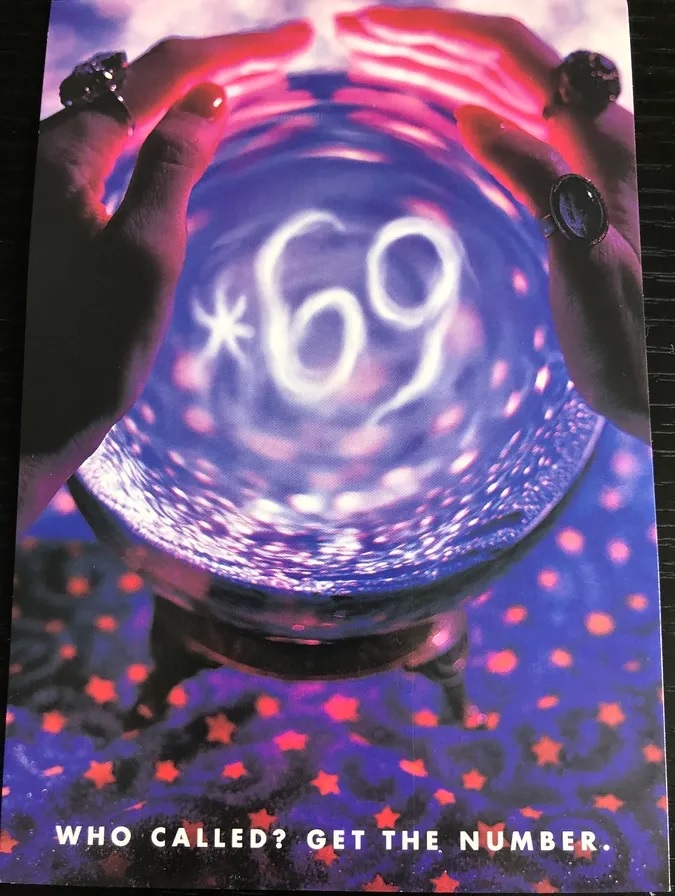nice
originally posted: 2023
For those of you not of a certain age, this number provided, essentially, caller ID. (In the United States, that is.) This was noteworthy enough to get a whole postcard.

Remember when the ability to see who called you was a wild new technological development, indistinguishable from magic, advertisable with a stock-character psychic holding a crystal ball above a movie-theater carpet? Remember when this was a gripping news lead worthy of The Washington Post?
"Constance Young uses Caller ID to scope out whether potential boyfriends really did try to phone her. Corey Albright says that using another telephone company service, return call, to find out who called has become a teenage ritual. Alexis Henderson worries that her husband has become obsessed with figuring out who called and hung up." - Ann O'Hanlon and Mike Mills, The Washington Post
(As the above quote implies, and as at least one of you was probably itching to interject, "caller ID" is a bit of a misnomer. This feature is actually called "last-call return"; the number, when dialed, would tell you the ID of whomever called you last. Think of it as the pull to caller ID's push.)
This feature was rolled out by telecoms around 1992, but the advertising barrage really kicked in in the mid-1990s. The 1992 article mentions a few quirky use cases for the then-nascent technology -- camping phone lines for concert tickets, deterring would-be prank callers -- but none of them compare to the breathtaking pettiness of this anecdote:
"[One interviewee] Henderson said her husband uses it to ring hang-up callers and ask, in a not-so-gentle voice, "Why did you call here?" His habit recently led to something Henderson called a "Star 69 war." Henderson called a colleague on her way out the door. The colleague didn't answer, and Henderson hung up rather than leave a message, then left her house. The colleague, who was home, used return call to call back, and Henderson's husband picked up. "My husband answers the phone, and {the colleague} says, Who's this?' " Henderson recalled. "And that immediately incensed him, and he said, Well, who's this?' So she hangs up. So he uses star 69 to call her back." - Ann O'Hanlon and Mike Mills, The Washington Post
I mean, here are just so many stories like this from the press at the time; in the 1990s, as today, the intersection of newly mainstream tech and lifestyle journalism is fertile with anecdotes. And, of course, job interview disasters:
"Sharon Bray, a West Dundee waitress, lost a job selling magazines at a kiosk in the Springhill Mall in Dundee because of it. She had a successful interview with a magazine salesman who was apparently insane about his privacy. He called Bray the next day to tell her when to start her new job, and, in lieu of leaving his number, told her roommate he’d call back when she got in. Upon her return, Bray pressed *69 and called him, whereupon he threw a fit of megalomaniacal proportions. “I Star 69ed him and it was some private line in his home,” Bray relates. “He got really irate. He said, `How did you get this number?’ I just said, `Excuse me? Supposedly you wanted me to work for you.’“ He went on and on for a bit about how he didn’t think their employer-employee relationship was working out, until Bray finally got fed up and said, “I don’t think I want to work for you anyway, if that’s your attitude,” and hung up. Job over." - Chicago Tribune
(I've made it several paragraphs without mentioning, well, the name of it. Presumably the number was chosen since the digits resemble the reverse symbol 🔃 -- though someone on Reddit has a spicier theory.)
return to blog index, or return home